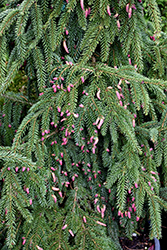It's all about ...
plants

Nutans Oriental Spruce
Picea orientalis 'Nutans'
Height: 20 feet
Spread: 12 feet
Sunlight:
![]()
![]()
Hardiness Zone: 4a
Description:
An outstanding upright variety of oriental spruce that features irregular, nodding or weeping branches of blue-green foliage; showy, bright pink male flowers appear in spring; ideal as a specimen to add interest in the landscape with its sculptural look
Ornamental Features
Nutans Oriental Spruce features showy clusters of hot pink flowers along the branches from mid to late spring. It has attractive silvery blue-variegated grayish green foliage which emerges chartreuse in spring. The tiny needles are highly ornamental and remain grayish green throughout the winter. The rough brown bark adds an interesting dimension to the landscape.
Landscape Attributes
Nutans Oriental Spruce is a dense evergreen tree with a strong central leader and a rounded form and gracefully weeping branches. It lends an extremely fine and delicate texture to the landscape composition which can make it a great accent feature on this basis alone.
This is a relatively low maintenance tree. When pruning is necessary, it is recommended to only trim back the new growth of the current season, other than to remove any dieback. It has no significant negative characteristics.
Nutans Oriental Spruce is recommended for the following landscape applications;
- Accent
- Shade
- Vertical Accent
Planting & Growing
Nutans Oriental Spruce will grow to be about 20 feet tall at maturity, with a spread of 12 feet. It has a low canopy with a typical clearance of 1 foot from the ground, and is suitable for planting under power lines. It grows at a slow rate, and under ideal conditions can be expected to live for 70 years or more.
This tree does best in full sun to partial shade. It is very adaptable to both dry and moist growing conditions, but will not tolerate any standing water. This plant does not require much in the way of fertilizing once established. It is not particular as to soil type or pH. It is somewhat tolerant of urban pollution, and will benefit from being planted in a relatively sheltered location. Consider applying a thick mulch around the root zone in winter to protect it in exposed locations or colder microclimates. This is a selected variety of a species not originally from North America.
This plant is not reliably hardy in our region, and certain restrictions may apply; contact the store for more information.
